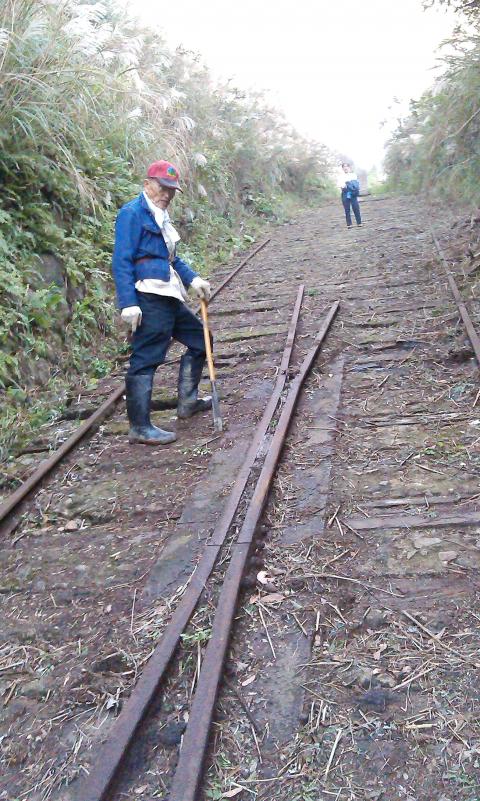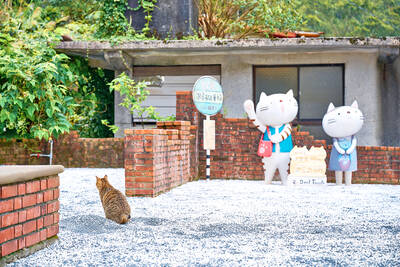Apparently inspired by the ancient Chinese proverb about an old man moving a mountain, for more than a year a group of elderly miners have been weeding, moving stones and paving roads to uncover an old mine railway, which was buried for the past 26 years in the former gold mining town of Jinguashih in New Taipei City’s Ruifang District. The group is urging the government to classify the area as an official historic site or historic building under the Cultural Heritage Preservation Act. The government is currently in the middle of the review process.
Cheng Chun-shan, an old Jinguashih miner, says that Taiwan Metals Mining Co shut down operations in 1987, and the railway fell into disuse, while the mine trolleys were auctioned off for scrap metal and the abandoned tracks were gradually overtaken by weeds and the wilderness.
Starting in October last year, four seniors — Cheng Chun-shan, Chen Shih-cheng, Lin Cheng-hsiung and Chang A-hui — along with dozens of other septuagenarians, commenced their project of “finding the road they once traversed.” With sickles and hoes in hand, they have walked the desolate hillside, chopping down weeds taller than themselves and clearing away boulders that fell down the hillside during typhoons. “We don’t have any particular agenda. We just want to locate the road again, which is part of Jinguashih residents’ collective memory,” Cheng says.

Photo: Yu Chao-fu, Liberty Times
照片:自由時報記者俞肇福
The hard work of the seniors has gradually received recognition from the government. Culture Minister Lung Ying-tai organized a team to survey the area on April 9, the New Taipei City Culture Affairs Department invited experts and academics to survey the area at the end of July, and an evaluation meeting was held on Dec. 6. A decision is expected to be made in the coming days as to whether the Jinguashih mine railway will be protected under the Cultural Heritage Preservation Act.
(Liberty Times, Translated by Kyle Jeffcoat)
金瓜石一群老礦工,用愚公移山的精神,歷經一年多的除草、清石、鋪路,讓消失廿六年的索道重見天日,呼籲官方依據文化資產保存法公告為「古蹟」或「歷史建築」保存,官方也進入審查程序。
金瓜石老礦工鄭春山說,一九八七年台金公司歇業,索道停止使用,台車被當廢鐵拍賣,而索道逐漸被荒煙蔓草覆蓋。

Photo courtesy of Cheng Chun-shan
照片由鄭春山提供
自去年十月開始,鄭春山、陳石成、林政雄、張阿輝四位及其他數十位平均年齡逾七十歲的老礦工,開始發起「把路走回來」行動,挽袖拿起鐮刀和鋤頭,走在荒煙蔓草的斜坡索道上,沿途割除比人還高的芒草,並整理因為颱風崩塌的土石;鄭春山說:「我們沒有甚麼特別的目的,只是想要找回這條路,找回屬於金瓜石人的記憶。」
老礦工的努力,逐漸被官方看見,今年四月九日,文化部部長龍應台率員探勘,七月下旬,新北市文化局也邀請專家學者實勘,本月六日召開評估會議,預計近日公告金水台車道是否納入文化資產保護範圍。
(自由時報記者李雅雯、俞肇福、賴筱桐)

A: Wow, US climber Alex Honnold has announced that he’s going to free-climb Taipei 101 on Jan. 24. And the challenge, titled “Skyscraper Live,” will be broadcast worldwide live on Netflix at 9am. B: Oh my goodness, Taipei 101 is the world’s tallest green building. Is he crazy? A: Honnold is actually the climber in the 2019 film “Free Solo” that won an Oscar for best documentary, and was directed by Taiwanese-American Jimmy Chin and his wife. He’s a legendary climber. B: Didn’t Alain Robert, “the French Spiderman,” also attempt to scale Taipei 101 in 2004? A: Yes, but

A: There are always adventurers who want to conquer Taipei 101 as a world-class landmark. Didn’t someone once parachute from the top of it? B: Yeah, that’s right. Austrian extreme sportsman Felix Baumgartner once parachuted from the rooftop observation deck in 2007 without permission. He died earlier last year in a powered paragliding crash at the age of 56. A: Hollywood superstar Tom Cruise also almost jumped off Taipei 101 for “Mission Impossible 3.” B: What? But I didn’t see the building in the movie. A: The news says that the film’s producers applied to the Taipei City

People use far more than just spoken language to communicate. Apart from using our voices to pronounce words, we also use body language, which includes countless facial expressions. Most people know that smiles and frowns indicate pleasure and displeasure, or that wide eyes with raised eyebrows typically show surprise. However, there is a lot more to learn about how facial expressions can help or hinder communication. People often unintentionally reveal their emotions through very tiny facial movements known as “microexpressions.” The term was popularized by psychologist Paul Ekman, who found that people from cultures across the world generally recognize

Nestled in the mountain region of northern Taiwan lies a small village that was once bustling due to a thriving coal industry, only to later gain fame for an entirely different reason — cats. This is Houtong Cat Village (猴硐貓村), located in Ruifang District, New Taipei City. Traditional Coal Mining and Village Transformation Houtong was originally known as “Monkey Cave” (houtong, 猴洞), a name derived from the wild monkeys that once inhabited caves in the surrounding hills. During the Japanese colonial period in the early 20th century, rich coal deposits were discovered and developed, rapidly turning Houtong into one of northern Taiwan’s